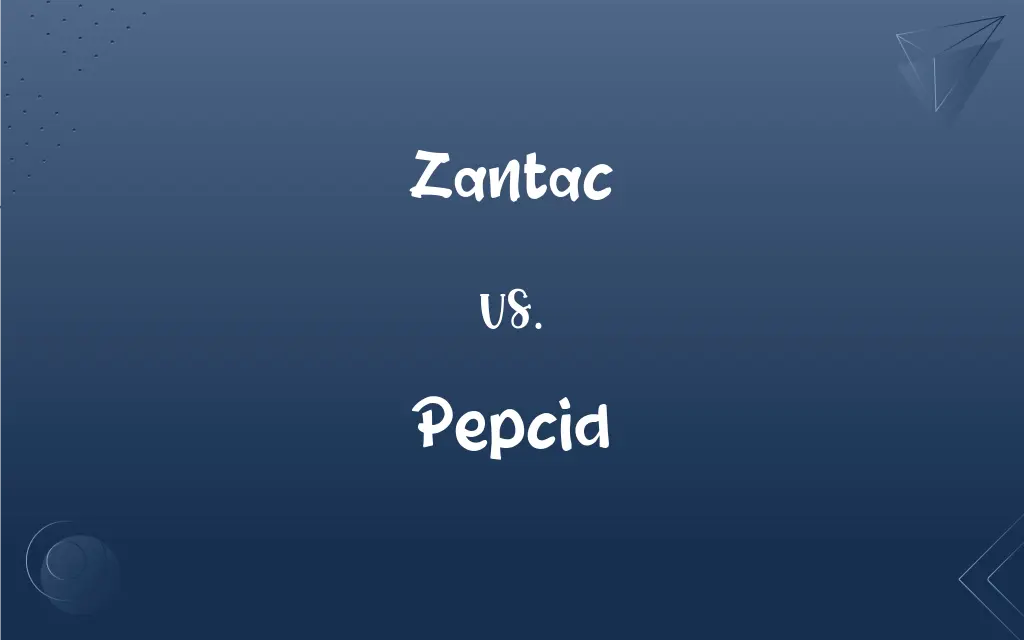Zantac vs. Pepcid: What's the Difference?
Edited by Janet White || By Harlon Moss || Updated on October 14, 2023
Zantac (ranitidine) and Pepcid (famotidine) are both medications used to reduce and manage stomach acid but differ in chemical composition and availability due to Zantac's recall over safety concerns.

Key Differences
Zantac, which is a brand name for the drug ranitidine, belongs to the class of drugs known as H2 blockers. Its primary function is to decrease the amount of acid produced by the stomach, which in turn can prevent and relieve heartburn, an acid reflux condition. Pepcid, conversely, is the brand name for famotidine, and although it is also an H2 blocker with a similar function to Zantac, it has a different chemical composition and structure.
Both Zantac and Pepcid have been utilized over the years to treat conditions like peptic ulcers, gastroesophageal reflux disease (GERD), and conditions where the stomach produces too much acid, such as Zollinger-Ellison syndrome. However, it’s vital to note that despite their similarities in applications, they do not share identical pharmacological profiles and have various dosage forms and strengths.
It is pivotal to note that Zantac was recalled from the market due to concerns that it may contain a probable carcinogenic contaminant known as N-nitrosodimethylamine (NDMA). Pepcid, however, has not faced such recalls and remains available on the market as a viable option for those seeking an H2 blocker. This fundamental difference currently impacts the availability and user choice between these two drugs.
Zantac and Pepcid can both be utilized in either prescription or over-the-counter (OTC) form depending on the nature and severity of the condition being treated. In the case of Zantac, prior to its recall, and Pepcid, they are both available in various forms including tablets, injection, and oral solutions, providing flexibility for usage.
To understand and select between Zantac and Pepcid, healthcare professionals typically would consider various factors, such as the patient’s medical history, the condition being treated, and potential side effects. Both drugs have been widely recognized in the medical community, yet due to the recent developments regarding safety concerns, Pepcid is often more predominantly prescribed nowadays.
ADVERTISEMENT
Comparison Chart
Active Ingredient
Ranitidine
Famotidine
Recall Status
Recalled due to potential contamination with NDMA
Not recalled
Available Forms
Prior to recall: Tablets, injections, and oral solution
Tablets, injections, and oral solution
Typical Use
Used for treating GERD, heartburn, and stomach ulcers
Used for treating GERD, heartburn, and stomach ulcers
Over-the-Counter
Available OTC before recall
Available OTC
ADVERTISEMENT
Zantac and Pepcid Definitions
Zantac
Zantac was widely used to treat conditions such as gastroesophageal reflux disease (GERD).
For years, people suffering from GERD found relief in Zantac.
Pepcid
Available in both prescription and over-the-counter formulations, Pepcid provides versatile treatment options.
Pepcid is conveniently available over the counter for occasional heartburn sufferers.
Zantac
Zantac has been recalled globally due to concerns over NDMA, a possible carcinogen, contamination.
The global recall of Zantac caused patients to seek alternative medications for heartburn relief.
Pepcid
Pepcid is a popular brand of the drug famotidine, used to control and reduce stomach acid.
After spicy meals, John often takes Pepcid to prevent heartburn.
Zantac
Zantac, as an H2 blocker, inhibits histamine action on stomach cells to decrease acid production.
The doctor prescribed Zantac to inhibit excess acid production in his stomach.
Pepcid
As an H2 blocker, Pepcid operates by inhibiting histamine, reducing acid production in the stomach.
Doctors recommend Pepcid to mitigate acid production and alleviate acid reflux symptoms.
Zantac
Zantac is a brand of the antacid drug ranitidine, utilized to reduce stomach acid levels.
She took Zantac to manage her persistent heartburn during meals.
Pepcid
Pepcid comes in multiple forms, such as chewable tablets and standard tablets, to cater to user preferences.
The chewable Pepcid tablets offer a user-friendly option for those averse to swallowing pills.
Zantac
Zantac was available in various forms, including tablets and injections, to accommodate different medical needs.
Zantac injections were occasionally used in hospitals to control acid levels in critical patients.
Pepcid
Pepcid is commonly used to treat various acid-related digestive issues, including peptic ulcers and GERD.
Maria was prescribed Pepcid to manage her peptic ulcer and reduce discomfort.
Zantac
A histamine blocker and antacid (trade name Zantac) used to treat peptic ulcers and gastritis and esophageal reflux
Pepcid
(pharmaceutical drug) Lowercase version of Pepcid
Pepcid
A histamine blocker (trade name Pepcid) used to treat peptic ulcers and gastritis and esophageal reflux
FAQs
What is Zantac used for?
Zantac was used to treat acid reflux, heartburn, and peptic ulcers.
Is Pepcid an H2 blocker?
Yes, Pepcid is an H2 blocker that reduces stomach acid production.
Is Zantac available for purchase currently?
Zantac has been recalled and is generally unavailable in markets due to safety concerns.
Can Pepcid be used to treat GERD?
Yes, Pepcid can be used to manage GERD by minimizing stomach acid.
Is it safe to give Pepcid to children?
Pepcid may be given to children on a healthcare professional’s advice.
Are Zantac and Pepcid the same?
No, while both are H2 blockers and manage stomach acid, they have different active ingredients.
Does Pepcid treat conditions other than heartburn?
Yes, Pepcid also treats conditions like GERD and peptic ulcers.
What is the active ingredient in Pepcid?
Famotidine is the active ingredient in Pepcid.
How quickly does Zantac work?
Zantac typically worked within 30 minutes to 1 hour after ingestion.
Can I substitute Zantac with Pepcid?
Often yes, but always consult a healthcare professional before substituting medications.
Is Pepcid available in multiple forms?
Yes, Pepcid is available in various forms, including tablets and chewable.
Can Pepcid cause side effects?
Yes, Pepcid can cause side effects like headache, constipation, and diarrhea in some users.
Why was Zantac recalled?
Zantac was recalled due to concerns about contamination with a possible carcinogen, NDMA.
Can Pepcid be bought without a prescription?
Yes, Pepcid is available in over-the-counter formulations for heartburn relief.
Is Pepcid safe for long-term use?
Generally, Pepcid is safe, but long-term use should be discussed with a healthcare professional.
Was Zantac available in different forms?
Yes, Zantac was available in forms like tablets, oral solution, and injections.
What is the primary ingredient in Zantac?
The primary ingredient in Zantac was ranitidine.
How often should Pepcid be taken?
Dosage and frequency of Pepcid depend on the individual and condition, always follow healthcare professional guidance.
Does Zantac cure stomach ulcers?
Zantac does not cure but helps to treat and manage stomach ulcers by reducing stomach acid.
Can I take Zantac during pregnancy?
It's vital to consult a healthcare professional before using any medication, like Zantac, during pregnancy.
About Author
Written by
Harlon MossHarlon is a seasoned quality moderator and accomplished content writer for Difference Wiki. An alumnus of the prestigious University of California, he earned his degree in Computer Science. Leveraging his academic background, Harlon brings a meticulous and informed perspective to his work, ensuring content accuracy and excellence.
Edited by
Janet WhiteJanet White has been an esteemed writer and blogger for Difference Wiki. Holding a Master's degree in Science and Medical Journalism from the prestigious Boston University, she has consistently demonstrated her expertise and passion for her field. When she's not immersed in her work, Janet relishes her time exercising, delving into a good book, and cherishing moments with friends and family.































































